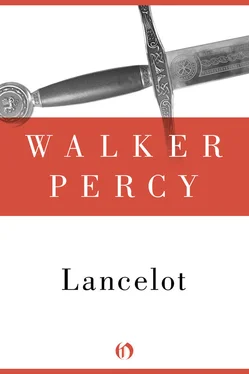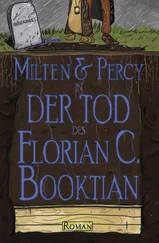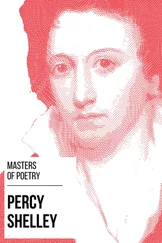She was as quick to pick up the bad manners of the film folk as the good manners of the gentry, yet she did it good-humoredly as if these transformations might be necessary but were not to be taken too seriously. What was surprising was how quickly she got onto the nutty nuances of actors and such. In a matter of weeks she had shed her Texas drawl and picked up the round deracinated bell tone of Raine Robinette, who like June Allyson (Merlin said) came from Washington Heights, even the plaintive up-pitched grace note at the end of each sentence, Raine’s trademark, so Merlin had to correct her — she dropped it as quickly — and the actors’ way of droning away in their mock enthusiasm for mock projects. Jacoby would go on and on about moving to Louisiana and starting a crawfish farm, going into great detail about the marketing and distribution of this remarkable shellfish, yet do it with a slight gap of inattention even to himself as if he were listening to his voice. What was surprising was how good she was at acting like one of them and how lousy she was at acting the second the cameras rolled.
In the lightning flashes I was looking at her and thinking how much I loved her. “Loved” her? Being “in love.” What does that mean? It means that I lived for love. “Lived for love.” What does that mean? It means simply that she was my happiness and that without her I was not happy. As the saying goes, I didn’t know what happiness was until I met her. Do you notice that it is impossible to speak of love without sounding like Tin Pan Alley? But it’s the truth nevertheless. I can’t live without you. Jesus, is there any other way to say it? I might have been content in my unhappiness if I had not met her, like one of those cave fish that don’t have eyes and don’t miss the sun.
But if I loved her, why did the discovery of her infidelity cause a pang of pleasure within me?
Before we were married she would drive by my office mid-afternoons and pick me up. She wouldn’t take no for an answer.
“But, Margot, I’m bushed”—I, a mole, a creaky, seer-suckered, liberal mole droning out the days with title search, estate succession, and integrating the schools of Feliciana Parish. Perhaps this was what I thought happiness was: keeping the River Road estates intact for the white gentry and evening things up by helping the Negroes.
Off we’d go, up or down the River Road, she driving her little $20,000 Mercedes, top down. I still blinking like a mole in the October sunlight beside her, dusty from the Annotated Louisiana Code, sniffing the German leather warm and fragrant in the sun.
Strange: It was almost as if she were the man, I the woman, so much did she take the lead, work the radio, drive the car like a man, drum her nails on the wheel, gauge the traffic, look swiftly back past me to change lanes, cast ahead in her mind for destination and route. I lumpish and docile in the seat beside her, hands in my lap, like a big dumb coed.
Like a man she was. I said, except that she would tilt her head and cut her eyes over to me, lids narrowed, lips thinned, seriously yet unseriously, as no man ever did. Or, to make herself comfortable in the hot afternoon sun, in a quick second’s motion lift her ass off the seat (she could dress in thirty seconds: she told me when she was a child she used to walk to town on Saturday in school clothes and change in the filling station restroom), hike her skirt up exposing her legs. Thought I, goofy from work and drunk on October pine-winey sunlight, catching sight of the sweet heavy convergence of her inner thighs: that is where I want to live, make my habitation.
“Well?” she’d say, driving up on the levee, stopping and leaning over the wheel cradled in her arms (like a man), gaze sideways at me, diamonds of sweat glittering on her upper lip.
Aha! She’s parked. What next? I felt a tingling running up the backs of my legs. Is this the way a woman feels, I wondered, when the man parks? Hm. We’re parked! What next?
“You know what you are?” she’d ask.
“No, what?”
“A big raunchy Sterling Hayden.”
“Who’s he?”
“Sterling Hayden tending bar in Macao, in seersuckers.”
“Is that good?”
They were beautiful October days. Do you know that I made one of the biggest discoveries of my life? It is the simplest of all discoveries but do you know that to this good day I don’t know whether I was the last man on earth to make it or whether I was the only man. Was I the dumbest man in the world or the luckiest? It is this: There is a life to be lived and a joy in living it and the joy has nothing to do with our crazy college carryings-on or with my crazy romantic dream of love with Lucy at Highlands. No, it was so much simpler than that. It was simply that there is such a thing as a beautiful day to go out into, a road to travel, good food to eat when you’re hungry, wine to drink when you’re thirsty, and most of all, 99 percent of all, no: all of all: a woman to love.
What else is there really in life, dear Percival, than love, an October day, a slope of levee, warm lips to kiss, and this droll man-woman creature lying beside me who was mostly man driving the car until the moment I kissed her, when all at once she became all woman and I could feel her neck giving way in that sweet flection-extension no man’s vertebrae ever managed, and her body of itself and in all its lovely breadth turn toward me on its axis to greet, salute me.
Yes, she loved me then. How do I know? Because at last I woke from my stupor and, remembering what courting was, courted her. In love, I drove to New Orleans to get her out of a Colonial Dames convention (for some reason it was important to her to be a Dame and damned if she didn’t haul me to South Carolina to find and photograph the tombstone of her only WASP ancestor (no Reilly in that war! a Johnson — sure enough, a Private Aaron Johnson killed in the Battle of Cowpens!). Into the ballroom of the St. Charles I walked, and up and down the aisle until I spied her in the crowd of two thousand lily-white Dames listening to another Dame talking about preserving U.S. ideals and so forth and, spotting her, signaled her out with a peremptory angling off of head and she came out, at first fearful: Was somebody dead? — then clapped her hands with joy, hugged and kissed me: “Oh, I’m so glad to see you! You came to see me! to get me? Oh oh—”
Being “in love” means that my heart leaped at the sight of her. I felt like clapping my hands too. Why her and no other woman? She had two eyes, a nose, mouth, legs like a billion other women — like a million other good-looking women, yet she acquired for me a priceless value. Elizabeth Taylor, as beautiful as she was then, could have walked by and I wouldn’t have looked at her twice. It was almost religious. Things she owned were like saints’ relics. The place where she lived with Tex, the big Garden District house, became a shrine — I could drive around and around the block and feel the tingle in my legs when I caught sight of the house — a Taj Mahal which held my live princess.
Was it possible that a man could be so happy on one afternoon and that there were so many afternoons? It was all so simple. We’d drive until we found a pretty place, a stretch of levee, a meadow off the Natchez Trace. We’d walk till we got tired, drink, eat, kiss, neck !
A confession: She took the lead the first time. No, not the first. The second. The first was my crude way with her the first time I saw her, barefoot and muddy, at Belle Isle, getting under her hoopskirt and so forth.
That day we had eaten crawfish étouffé and gumbo and drunk two bottles of wine and were full and happy and zooming up the River Road in the October twilight and I was thinking of a place to go to park, maybe even a meadow to lie in. But she just said: “Let’s go to bed.” I swallowed hard and felt like saying gollee or something like, a thirty-five-year-old man: gollee. Nowadays any eighteen-year-old would laugh at me. Yes, but I notice that young men are not as happy with their girls, at least not as happy as I was. “Do you know a place?” she asked. Happily, I did, in Asphodel, a little tourist cottage in a glen off the Trace. My hand trembled as I registered. She undressed without bothering to turn out the light (as quickly as in the Texaco restroom in Odessa: zip! zip! naked!). She stood naked before the mirror, hands at her hair, one knee bent, pelvis aslant. She turned to me and put her hands under my coat and in her funny way took hold of a big pinch of my flank on each side. Gollee. Could any woman have been as lovely? She was like a feast. She was a feast. I wanted to eat her. I ate her.
Читать дальше












